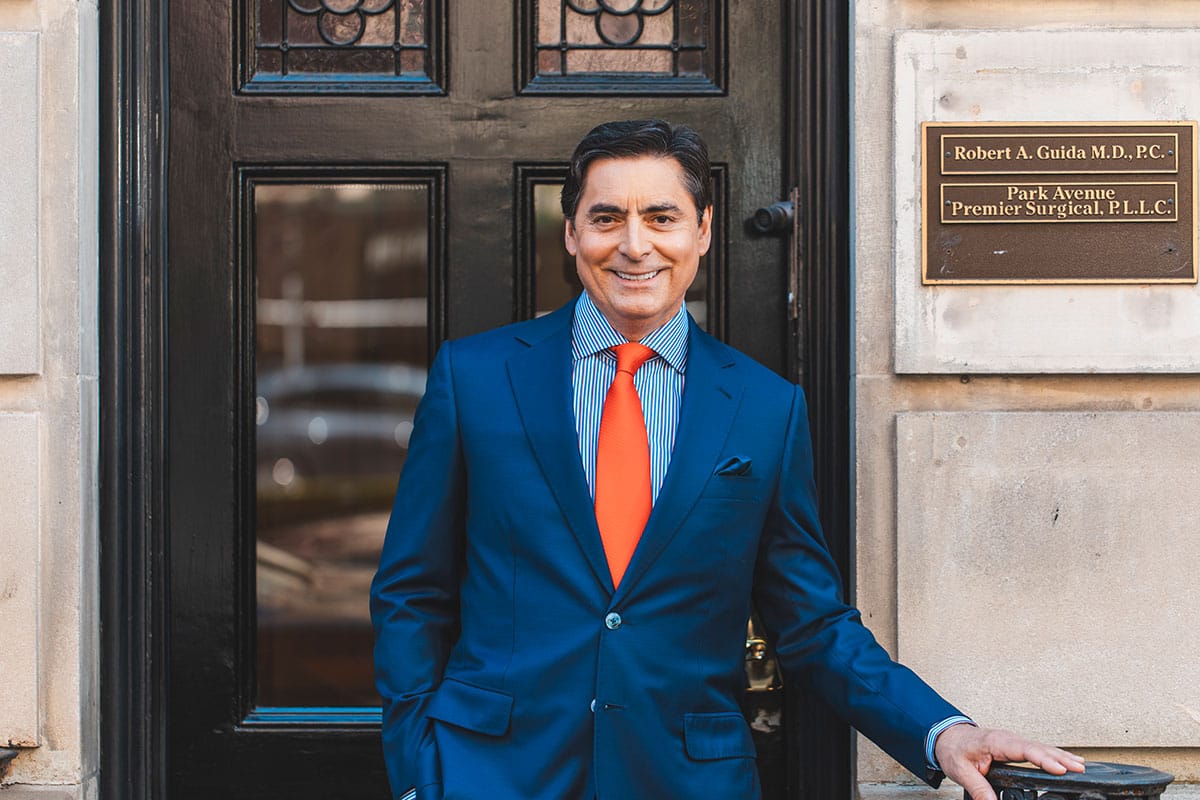A facelift restores youthful contours, but Dr. Robert A. Guida offers two advanced options for natural, long-lasting results. With over 30 years of experience, Dr. Guida’s precision and artistry make him one of the best facelift surgeons in NYC. His Full/SMAS facelift lifts and repositions deep facial tissues for a refreshed look without a pulled appearance. For a more comprehensive approach, his 3-in-1 facelift combines the SMAS technique with neck liposculpting and CO₂ laser skin tightening, addressing both deep structures and surface aging.
What is a Facelift?
A facelift is a surgical procedure to rejuvenate the face by addressing signs of aging. It involves removing excess facial skin, tightening underlying tissues, and reshaping the face’s contour. This procedure focuses on areas like the jowls, neck, and lower face to smooth out wrinkles and restore a youthful appearance. Dr. Guida is a premier choice as one of the top facelift surgeons in New York City, and often treats individuals in their 40s, 50s, 60s, or beyond. The primary facelift procedure Dr. Guida specializes in offers significant and lasting aesthetic improvements with a natural, refreshed look.
Meet Premier Facelift Surgeon Dr. Robert A. Guida, MD
Dr. Guida is a highly regarded facial plastic and reconstructive surgeon with over 30 years of experience. He is recognized as one of the best facelift surgeons in NYC, specializing in a wide range of cosmetic and functional surgeries including rhinoplasty, facelifts, neck lifts, eyelid surgery, otoplasty, facial reconstruction, and skin cancer removal (Mohs surgery).
A graduate of Drexel University with fellowship training in facial plastic and reconstructive surgery from Oregon Health & Science University in Portland, Dr. Guida was named a 2024 New York Metro Top Doctor.
PROFESSIONAL CREDENTIALS
- B.S. in Biology, Summa Cum Laude – University of Steubenville, Ohio
- M.D. – Hahnemann University School of Medicine (now Drexel University), Philadelphia
- Internal Medicine Internship – Lankenau Hospital, Philadelphia
- General Surgery Internship – The Graduate Hospital, University of Pennsylvania
- Otolaryngology–Head & Neck Surgery Residency – New York Eye and Ear Infirmary, NYC
- Facial Plastic & Reconstructive Surgery Fellowship – Oregon Health & Science University, Portland
LEARN MORE ABOUT DR. GUIDA

Dr. Guida's Facelift Techniques
Dr. Robert A. Guida offers a range of facelift procedures tailored to individual needs:
This innovative procedure combines an SMAS facelift with neck liposculpting and CO₂ laser skin tightening. It addresses deep facial tissues, contours the neck, and enhances skin texture for comprehensive rejuvenation.
Targeting the Superficial Musculoaponeurotic System (SMAS), this technique lifts and repositions deeper facial structures. It offers natural-looking results by addressing sagging in the midface, jowls, and neck.
A minimally invasive option ideal for early signs of aging. It focuses on the lower face and neck, tightening mild to moderate sagging with smaller incisions and shorter recovery time.
Designed for individuals seeking to correct or enhance results from a previous facelift. This complex procedure addresses issues like asymmetry or unsatisfactory outcomes to restore facial harmony.
Concentrating on the lower third of the face, this surgery addresses sagging skin, jowls, and loss of jawline definition. It refines the neck and jaw areas for a rejuvenated appearance.
Each procedure is customized to meet the patient’s unique aesthetic goals and anatomical considerations.
What Issues Does a Facelift Address?
- Sagging in the midface
- Deep creases below the lower eyelids
- Deep creases along the nose extending to the corner of the mouth
- Facial fat that has fallen or is displaced
- Loss of muscle tone in the lower face, creating jowls
- Loose skin and excess fatty deposits under the chin and jaw
- Wrinkled or sun-damaged facial skin
- Uneven skin tone or texture
- Slackened skin and decreased elasticity
- Overall tired or aged facial appearance

Real Facelift Patient Testimonial
Consult Dr. Guida, the Best Facelift Surgeon in NYC
Dr. Guida is known as one of the best facelift surgeons in NYC, with over 25 years of recognition as one of the Best Doctors by the Castle Connolly Guide. He is double board-certified in facial plastic and reconstructive surgery and otolaryngology, and he takes the time to understand each patient’s unique goals and concerns. Schedule a consultation with Dr. Guida today to explore your personalized facial rejuvenation options.